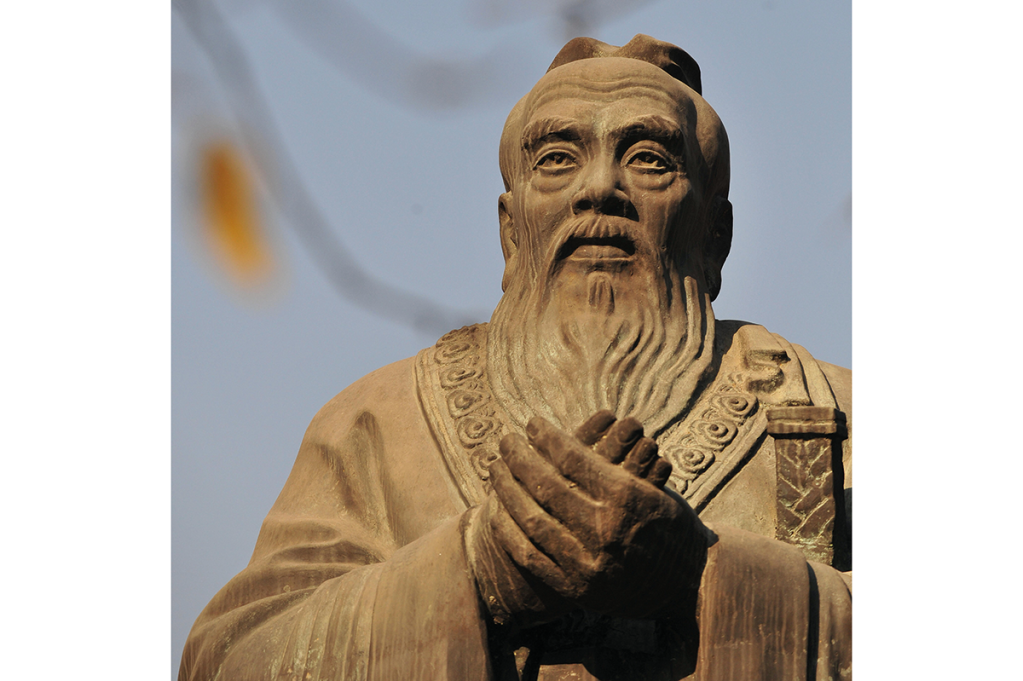Sohrab Ahmari is an ogre sent by Satan to annihilate American freedom. At least, that’s the reputation he has with liberals of the more excitable sort. His new book ought to soothe their twitchy nerves. The Unbroken Thread is an easy going, ecumenical, rather cosmopolitan tour of 12 moral questions and select thinkers who responded to each of them.
‘My primary purpose,’ writes our implausible theocrat, is ‘not to offer definitive answers, drawn from any one particular tradition, but to explore the possibility that our contemporary philosophy might be wrong in crucial respects.’
Ahmari has been much vilified for his criticism of Drag Queen Story Hour, an event in which crossdressers introduce themselves to children in public libraries. There is no mention of that here, however, nor is there any settling of scores with David French, the former National Review commentator (now of the Dispatch website) who defended transvestite story time as ‘one of the blessings of liberty’.
As the op-ed page editor of the New York Post, Ahmari is not one to flinch from a fight, but The Unbroken Thread is pitched toward progressives who might be open to discovering common ground with a traditionalist Catholic convert. Ahmari does, after all, have personal experience with religious oppression, having been born under the revolutionary Islamist regime in Iran.
Until just a few years ago, he was also an outspoken champion of liberal democracy in the mold of Commentary magazine, where he was a senior writer. And as Ahmari relates in these pages, his family always had a western outlook: ‘My father [was] a post-modernist architect, my mother an abstract-expressionist painter.’ For a time, Ahmari. was an atheist and Marxist. He knows the progressive mentality well.
The Unbroken Thread reflects that: Ahmari uses ‘she’ and ‘her’ where English would traditionally use masculine pronouns for instances of unspecified sex, and the sins of racism, sexism, colonialism and consumerism come in for as much execration here as in any trendy tome of Critical Race Theory or gender studies. The radical feminist Andrea Dworkin stands alongside Confucius, St Augustine, St Thomas Aquinas and Aleksandr Solzhenitsyn in the pantheon of moral sages Ahmari has assembled.
Each of his dozen chapters pairs a sage with a philosophical or theological inquiry, such as ‘Does God respect you?’ and ‘Should you think for yourself?’ Some of the pairings are more successful than others, and why these particular questions should interest us more than others is not something for which Ahmari provides an argument. But as he makes clear, his aim is not to build a system of any kind but to draw attention to the persistent thread of moral inquiry to be found in ancient, contemporary, eastern, western, pagan, Jewish, Catholic, Protestant and feminist traditions.
For all their diversity, they all posed questions — and provided answers — that sit uneasily with the prejudices of modern individualism. A conservative may distrust Dworkin and a progressive might not like Cardinal Newman, but the very eclecticism of the thinkers Ahmari has drawn together defies anyone’s easy dismissal. Alongside what might seem like obvious picks, such as C.S. Lewis, St Thomas, St Augustine, Confucius, Seneca, Newman and Solzhenitsyn, and the defiant selection of Dworkin, there are figures such as Rabbi Abraham Joshua Heschel, the anthropologist Victor Turner, the civil-rights activist Howard Thurman and the scholar of Gnosticism Hans Jonas.
Two Maximilians tie the book together. St Maximilian Kolbe was a Catholic priest who willingly accepted another man’s death sentence at Auschwitz. The other Maximilian is Ahmari’s son, to whom the letter that closes The Unbroken Thread is dedicated. There and in his introduction, Ahmari wonders what kind of man his boy will grow up to become in an America where getting ahead, fitting in and fornicating are the culture’s motive forces and personal imperatives.
Ahmari’s questions are designed to prick the conscience behind that ethos. The first, ‘How do you justify your life?’, is framed rather broadly, though the figure Ahmari chooses to answer, C.S. Lewis, provides an apt account of the perils of reducing human life to the quanta of science. Lewis’s novel of an arrogant scientist who dreams of subjugating intelligent life on Mars, Out of the Silent Planet, is a parable, writes Ahmari, of the ‘colonialist, eugenic and racial ideologies of the early 20th century that held that “advanced” civilizations had the right, by dint of their scientific advancement, to displace, subdue, and destroy “primitive” peoples and to exterminate the less intelligent’. For Lewis, and Ahmari, the justification for sentient life is to be found in its inherent moral dignity, not in its place on a pseudo-scientific scale of intellectual advancement.
The answer to the second chapter’s question, ‘Is God reasonable?’, is supplied by an outline of Thomas Aquinas’s faith-informed philosophy, particularly his Five Ways of reasoning about the existence of God. ‘Why would God want you to take a day off?’, the third chapter’s inquiry, is an occasion for a study of Rabbi Heschel’s life and the argument of his 1951 book The Sabbath.
Victor Turner and his wife Edith, atheist anthropologists who converted to Catholicism after profound experiences with tribal religion while undertaking field research in Africa, are the oracles for the chapter asking ‘Can you be spiritual without being religious?’ The casually spiritual-but-not-religious American of today lacks the authoritative rituals that knit together small tribes and the universal Catholic Church alike.
‘The rites of the “spiritual but not religious” are essentially privatized,’ Ahmari writes. ‘Though they act ritually, adherents don’t bind themselves to a shared account of ultimate meaning or a network of symbols handed down over generations.’
Howard Thurman’s experiences in an era of segregation and the dying days of European colonialism are the lens through which Ahmari views the question of ‘Does God respect you?’ — the answer to which, of course, is yes, even when society and political power do not. The reply that Confucius gives to ‘How must you serve your parents?’ can also be summed up in a few words: faithfully, selflessly and well. The lives of Thurman and Confucius themselves, however, are what give these simple answers power.
The back-to-back chapters featuring Cardinal Newman (‘Should you think for yourself?’) and Solzhenitsyn (‘What is freedom for?’) might set liberals’ teeth on edge. They know that they’re in for it with Solzhenitsyn’s famous — or, as they would have it, infamous — 1978 Harvard commencement address, in which the Russian dissident criticized the flabby freedom of the west and had some particularly pointed remarks about the way the press abused its liberties. But the Newman chapter may distress them even more, with Newman’s and Ahmari’s insistence that authority should shape the conscience.
Responding to the Victorian prime minister William Ewart Gladstone’s fusillades against the dogma of papal infallibility (which Gladstone believed was tantamount to intellectual murder), Newman drew a distinction between freedom of conscience, which the Church could not violate without undermining its own foundations, and the freedom to hold any opinion whatsoever. These, it should be noted, were questions of moral and intellectual freedom, not legal freedom. If the difference is hard for liberals to discern today, they should consider the moral and intellectual constraints that they apply on social media and college campuses supposed to be bastions of free inquiry.
Ahmari’s account does less than adequate justice to Gladstone, unfortunately. He was not a moral relativist and, contrary to the author’s claims, did not count among his ‘causes’ a ‘hostility…to religious establishments’. Gladstone, a deeply devout Protestant, defended the establishment of the Church of England within England itself. But he came to oppose the imposition of an Anglican establishment on Catholic Ireland, an opposition with which Ahmari ought to sympathize in solidarity with his coreligionists in the Emerald Isle.
The Augustine, Dworkin and Hans Jonas chapters share a thread: all touch upon sex, the moral dignity of the body and the heresy of Gnosticism. The Augustine chapter answers the question ‘Does God need politics?’ with the assertion that politics needs the common good which, following Augustine, ultimately must be understood with reference to God and the religion He ordains. But before he became a Christian, Augustine was a Manichaean, and the Gnosticism of that sect shaped his thinking, especially — though Ahmari doesn’t emphasize this — about sex. Ahmari does not endorse Andrea Dworkin’s view of sex as basically rape and men as rapists, but he finds her to be broadly Augustinian on the question of ‘Is sex a private matter?’ Christian saint and radical feminist would both say ‘no’.
Nor does Ahmari call attention to a rather stronger ancient precedent for Dworkin than Augustine: namely, Gnosticism’s complete rejection of the flesh as evil, with the corollary (for some sects, anyway) that sex itself was to be entirely avoided. Ahmari’s chapter on the existentialist philosopher Hans Jonas and his investigations into Gnosticism is intended to address the inquiry ‘What do you owe your body?’, with the answer being that a rejection of the body, and this material world of embodiment, leads to nihilism and potentially to the horrors of Nazism. Dworkin, whatever her sins, was not a Nazi. Nor did she, like the Gnostics, value the incorporeal spirit over material existence.Yet much of the sense of moral pollution arising from sex that the Gnostics evidently felt, and even Augustine seemed to feel in his more Gnostically-inclined moods as a Christian, was the animating force of Dworkin’s ideology.
Lessons from Seneca on dying well, in response to ‘What’s good about death?’, conclude Ahmari’s interrogation of the sages. Classically educated readers will not encounter any new thoughts here — and many readers will be familiar with the arguments of most of the figures Ahmari covers, though surely not all of them — but The Unbroken Thread will be of great service to Americans who have been deprived of their moral and philosophical inheritance by a shallow educational establishment. There was a world of value before the Great Awokening, even before classical liberalism or the Enlightenment. Sohrab Ahmari introduces a generation (and more) to the spiritual patrimony of which they have been robbed. And he does it in the gentlest way possible, knowing that its riches may dazzle eyes that have too long alighted on only the rusted scrap of utilitarian liberalism.
This article was originally published in The Spectator’s May 2021 World edition.

























